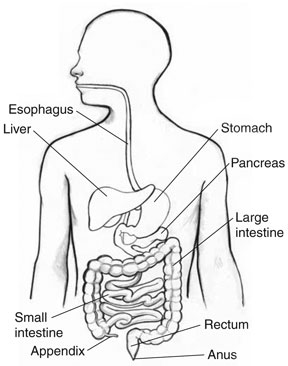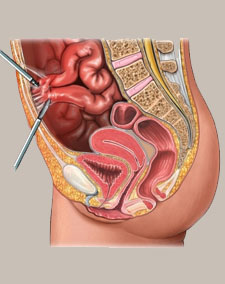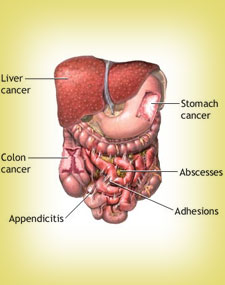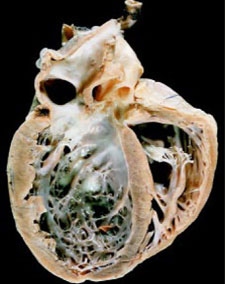|
What are Abdominal Adhesions?
Abdominal adhesions are bands of tissue
that form between abdominal tissues and organs. Normally, internal
tissues and organs have slippery surfaces, which allow them to
shift easily as the body moves. Adhesions cause tissues and organs
to stick together. Although most adhesions cause no symptoms or
problems, others cause chronic abdominal or pelvic pain. Adhesions
are also a major cause of intestinal obstruction and female
infertility.

Causes for
abdominal adhesions
Abdominal surgery is the most frequent cause of
abdominal adhesions. Almost everyone who undergoes abdominal
surgery develops adhesions; however, the risk is greater after
operations on the lower abdomen and pelvis, including bowel and
gynecological surgeries. Adhesions can become larger and tighter
as time passes, causing problems years after surgery.
Surgery-induced causes of abdominal adhesions
include
- tissue incisions, especially those involving
internal organs
- the handling of internal organs
- the drying out of internal organs and tissues
- contact of internal tissues with foreign
materials, such as gauze, surgical gloves, and stitches
- blood or blood clots that were not rinsed out
during surgery
A less common cause of abdominal adhesions is
inflammation from sources not related to surgery, including
- appendicitis—in particular, appendix rupture
- radiation treatment for cancer
- gynecological infections
- abdominal infections
How can
abdominal adhesions cause intestinal obstruction?
Abdominal adhesions can kink,
twist, or pull the intestines out of place, causing an intestinal
obstruction. An intestinal obstruction partially or completely
restricts the movement of food or stool through the intestines. A
complete intestinal obstruction is life threatening and requires
immediate medical attention and often surgery.
What are the symptoms of
abdominal adhesions?
Although most abdominal
adhesions go unnoticed, the most common symptom is chronic
abdominal or pelvic pain. The pain often mimics that of other
conditions, including appendicitis, endometriosis, and
diverticulitis.
How can abdominal adhesions
cause female infertility?
Abdominal adhesions cause female
infertility by preventing fertilized eggs from reaching the
uterus, where fetal development takes place. Adhesions can kink,
twist, or pull out of place the fallopian tubes, which carry eggs
from the ovaries—where eggs are stored and released—to the uterus.
What are the
symptoms of an intestinal obstruction?
Symptoms of an intestinal obstruction include
- severe abdominal pain or cramping
- vomiting
- bloating
- loud bowel sounds
- swelling of the abdomen
- inability to pass gas
- constipation
How are
abdominal adhesions and intestinal obstructions treated?
Treatment for abdominal adhesions is usually not
necessary, as most do not cause problems. Surgery is currently the
only way to break adhesions that cause pain, intestinal
obstruction, or fertility problems. More surgery, however, carries
the risk of additional adhesions and is avoided when possible.
A complete intestinal obstruction usually
requires immediate surgery. A partial obstruction can sometimes be
relieved with a liquid or low-residue diet. A low-residue diet is
high in dairy products, low in fiber, and more easily broken down
into smaller particles by the digestive system.
Can abdominal adhesions be
prevented?
Abdominal adhesions are difficult to prevent;
however, surgical technique can minimize adhesions.
Laparoscopic surgery avoids opening up the
abdomen with a large incision. Instead, the abdomen is inflated
with gas while special surgical tools and a video camera are
threaded through a few, small abdominal incisions. Inflating the
abdomen gives the surgeon room to operate.
If a large abdominal incision is required, a
special filmlike material (Seprafilm) can be inserted between
organs or between the organs and the abdominal incision at the end
of surgery. The filmlike material, which looks similar to wax
paper, is absorbed by the body in about a week.
Other steps during surgery to reduce adhesion
formation include using starch- and latex-free gloves, handling
tissues and organs gently, shortening surgery time, and not
allowing tissues to dry out.
Points to Remember
- Abdominal adhesions are bands of tissue that
form between abdominal tissues and organs, causing tissues and
organs to stick together.
- Although most adhesions cause no symptoms or
problems, others cause chronic abdominal or pelvic pain, bowel
obstruction, or female infertility.
- Abdominal surgery is the most frequent cause
of abdominal adhesions.
- Abdominal adhesions can kink, twist, or pull
the intestines out of place, causing an intestinal obstruction.
- A complete intestinal obstruction is life
threatening and requires immediate medical attention and often
surgery.
- Abdominal adhesions cause female infertility
by preventing fertilized eggs from reaching the uterus, where
fetal development takes place.
- No tests are available to diagnose adhesions,
and adhesions cannot be seen through imaging techniques such as
x rays or ultrasound.
- An intestinal obstruction can be seen through
abdominal x rays, barium contrast studies—also called a lower GI
series—and computerized tomography.
- Surgery is currently the only way to break
adhesions that cause pain, intestinal obstruction, or fertility
problems.
|







